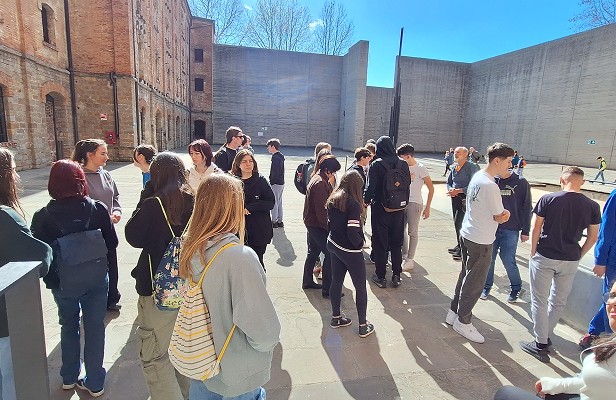The #WeRemember Journeys project is dedicated to preserving the memory of the Holocaust through a series of educational and institutional activities. The project aims to achieve several objectives, including building institutional capacity for increasing knowledge about the Holocaust among young people, fostering active citizenship skills, enhancing educators' teaching tools in national languages, and raising public awareness about the Holocaust's relevance in today’s world.
Throughout 2023-2024 the project successfully engaged students from 13 schools in 10 European countries—Austria, Bulgaria, Czechia, Croatia, Germany, Greece, Hungary, Slovenia, Sweden, and Poland—including both Jewish and non-Jewish schools. Each school embarked on its own unique #WeRemember Journey through a powerful, multi-stage educational experience that combined visits to the sites where the Holocaust took place, personal stories, and creative expression in various forms of art. The project culminated in public exhibitions of the students’ artworks displayed in their schools. Over 1000 students, teachers, parents and wider community participated in project activities.
The #WeRemember Journeys is a joint-initiative of the World Jewish Congress, the Ronald S. Lauder Foundation, and the Auschwitz-Birkenau Memorial Foundation in close cooperation with the International Center of Education about Auschwitz and the Holocaust and is funded by the European Commission.




The local visits to places where the Holocaust happened provided students with an opportunity to connect the subject of Holocaust education to the communities in which they live.
Each participating school chose its own local Holocaust memorial sites, Jewish museums, or historical locations tied to Jewish history. These visits allowed students to explore histories and narratives specific to their region, focusing on local atrocities, the role of local governance, ordinary people, and the bravery of those who protected Jews. By engaging with these sites, students gained a tangible understanding of the Holocaust’s impact on their own surroundings and saw that its effects were felt not just in remote concentration and extermination camps, but across Europe, shaped by the actions of certain individuals.





The virtual tour Auschwitz. In front of your eyes ® provided a shared, Pan-European experience. The tour, led by Museum guides, gave students access to one of the most significant sites of the Holocaust, offering them a chance to explore Auschwitz I and Auschwitz II-Birkenau virtually. The common destination allowed all participants, regardless of location, to experience the camp's history in a standardized, interactive format.
The use of advanced technology brought additional layers of content and details that physical visitors cannot access, making it a powerful educational tool for connecting students to the broader scope of Holocaust history. While the local visits focused on personal connections to their own histories, the online tour expanded their understanding of the Holocaust at a continental level, giving them insight into the shared experiences of victims across Europe.
.jpg)
.jpg)
.jpg)
The “History Captured in Artifacts” workshop was designed to deepen students' understanding of the Holocaust by engaging with objects from the Auschwitz-Birkenau State Museum. In a 90-minute session, students analyzed items that once belonged to individuals deported to the Auschwitz concentration camp. The selected artifacts, such as personal items, photographs, and documents, were chosen because they connected directly to individual fates and helped illustrate the broader human toll of the Holocaust.
The workshop focused on a variety of topics, including the experiences of women and children, the persecution of Jews, the Sonderkommando, the forced resettlement of civilians, and the memory and remembrance of those lost. Each artifact served as a starting point for discussions about the reality of camp life and the personal stories behind these objects. Through this workshop, students created narratives that brought these objects and their original owners to life.




In the final stage of the #WeRemember Journeys project, students reflected on their educational experiences. With the guidance of their teachers, students used various techniques to express their emotions and insights through paintings, sculptures, writings, videos, research projects and even podcasts. These works served as personal testimonies of their journeys through Holocaust education.
The artworks were initially displayed in local exhibitions at their schools, where students shared their reflections with the school community. The exhibitions were warmly received by attendees, highlighting the impact of the project and the importance of Holocaust education. Through their respectful expressions of creativity, students reinforced the relevance of remembering the Holocaust in today’s world.
This gallery showcases artworks created by students from 13 schools across 10 European countries. Throughout the project students embarked on their individual journeys of learning about the Holocaust, fostering remembrance and understanding through art.

The World Jewish Congress (WJC) is the international organization representing Jewish communities in over 100 countries across six continents. Founded in 1936 to unite Jewish voices in the face of rising antisemitism and the looming threat of the Holocaust, the WJC has since been at the forefront of defending Jewish rights, preserving Jewish heritage, and combating hatred and discrimination worldwide. Today, the WJC continues to serve as the diplomatic arm of the Jewish people, engaging with governments, international organizations, and civil society to promote tolerance, human rights, and interfaith understanding.

The Ronald S. Lauder Foundation underwrites the future of Jewish life in Europe through supporting excellent Jewish schools. With flagship projects in European capital cities, including Athens, Berlin, Budapest, Prague, Rome, Sofia and Vienna, the Foundation provides financial, educational, and strategic support to Jewish communities to better enable their schools to prepare young Jews for personal and professional success, and active participation in Jewish life. Since its founding in 1987, the Foundation has reached tens of thousands of Jewish children across Europe.

The Auschwitz-Birkenau Foundation is a non-profit organization established in 2009 with the primary mission of preserving the Auschwitz-Birkenau Memorial Site—the former Nazi German concentration and extermination camp in Poland. While its main mission is preservation, the Foundation also supports educational initiatives related to the history of Auschwitz and the Holocaust.